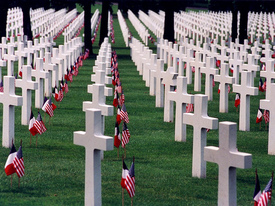O God, our Father, endless source of life and peace, welcome into Your merciful embrace the fallen of the war that raged here, the fallen on all wars that have bloodied the earth.
Grant that they may enjoy the light that does not fail, which in the reflection of Your splendor illumines the consciences of all men and women of good will.
You, Who in Your Son Jesus Christ gave suffering humanity a glorious witness of Your love for us, You, Who in our Lord Christ gave us the sign of a suffering that is never in vain, but fruitful in Your redeeming power, grant those who yet suffer for the blind violence of fratricidal wars the strength of the hope that does not fade, the dream of a definitive civilization of love, the courage of a real and daily activity of peace.
Give us your Paraclete Spirit so that the men of our time may understand that the gift of peace is much more precious than any corruptible treasure, and that while awaiting the day that does not end we are all called to be builders of peace for the future of
Your children.
Make all Christians more convinced witnesses of life, the inestimable gift of Your love, You Who live and reign for ever and ever. Amen,
(Pope Benedict XVI, Polish Military Cemetery, Montecassino, May 24, 2009)

